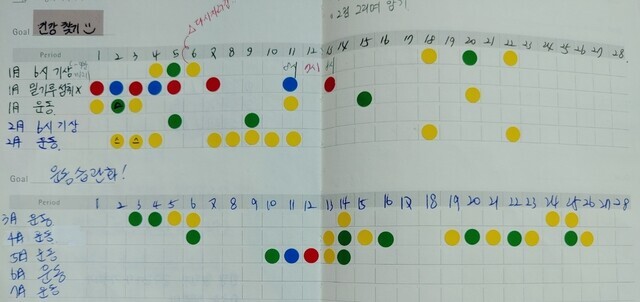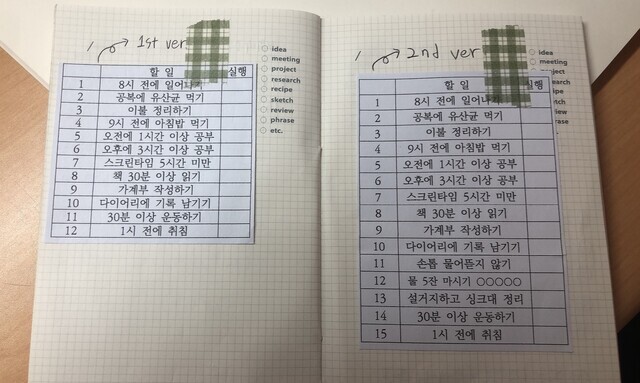hankyoreh
Links to other country sites 다른 나라 사이트 링크
How S. Korean zoomers are coping with COVID blues with "god-saeng" lifestyle

A 26-year-old graduate student, posted a blog message early this month that began, "Today, I start living my best life!"
The 26-year-old also posted a daily schedule packed with events in 30-minute increments. It started at 8 am, when they would wake up, work out at home, shower, study Excel, and eat lunch.
In the afternoon, they were scheduled to watch YouTube videos on design programming and address "character and aptitude issues." The graduate student's day ended at 11 pm with 15 minutes spent copying from the Bible by hand.
For each of the items completed on the schedule, they took a "confirmation" photograph of a timepiece showing the time. At times, they were unable to do all the things planned. In those cases, they went to bed with a vow to "continue living my best life tomorrow."
"Living your best life" — known as "god-saeng" in Korean — is a growing trend among members of South Korea's Generation Z born in the mid-1990s or later. The Korean term is coinage that combines "saeng," meaning "life," with the word "god," which is often attached in English form to refer colloquially to something superior.
The term is often used to refer to an "outstanding life that is a model to others." At its core, it is about regularly doing things that offer a small sense of achievement.
The COVID-19 pandemic has resulted in people spending more time at home, without opportunities to experience a sense of accomplishment through outside activities or interpersonal relationships. As a result, the "best life" approach has been gaining ground among South Koreans in their teens and twenties.
An examination of monthly search numbers for the term "god-saeng" over the past three years using Naver's search volume analysis system Data Lab showed a roughly hundredfold increase in searches over the 18 months since February 2020.

Data Lab tracks relative changes over a particular period by setting a value of 100 for the largest volumes of searches for a specific term. In February 2020, "god-saeng" recorded a score of 1.
By January 2021, it was all the way up to 63. Last month, it received a score of 100. On YouTube and social networking services, many users have been posting messages sharing their own "best life" experiences and tricks.
The people practicing this lifestyle — known colloquially as "god-saengers" — are not seeking the kind of life that results in material wealth and glory. This form of "best life" is about keeping wasted time to a minimum and practicing habits on a daily basis to afford even a small sense of personal achievement.
The schedules are not hugely ambitious. From "making the bed as soon as I get up" to "drinking five glasses of water a day" and "not lying down as soon as I eat," the basic elements of "god-saeng" practice are minor enough that previous generations may well ask, "Are these really goals?"
There's a term for that sort of goal too: "sohwakseong," which literally means a "small but definite sense of accomplishment."
In January, the Univ Tomorrow Research Laboratory for the Twenties published a report on "leisure and self-development trends in the M and Z Generations" based on a survey of 900 members of those generational cohorts.
The results showed 70.3 percent of respondents agreeing that "even small achievements are very meaningful to my life." Another 65.8 percent agreed that "self-development does not have to be about big goals."
Lee Ga-yeong, a 24-year-old who is studying for examinations while practicing habits such as "getting up at 7 am" and "eating three meals a day," said, "Since I'm studying for tests, I don't get to see visible achievements in a short period of time, which left me feeling tired and lacking in confidence."
"I started living my 'best life' because I wanted to feel even a small sense of achievement every day," Lee said.
The "god-saengers" emphasize productive self-development activities like study, work, and exercise, but they also prioritize tending to their own feelings of exhaustion. That's why common parts of the "best life" schedule include things like "eating dessert off a nice plate" and "writing three lines in my journal while listening to a song I like."
Rather than contenting themselves with their own best lives, they also monitor and encourage friends and fellow "god-saengers."
They may adopt a "habit tracker" approach of placing stickers on a piece of paper for every plan that is carried out, or they may use self-management applications to record and share their daily schedule. Popular apps include Chlngers, where users put down a deposit that they get back when they achieve their goal, and Todo Mate, where they can set daily goals, share them with friends, and leave messages of support.
Three or four years ago, the big catchphrase was "YOLO," an acronym for "you only live once" — meaning that you should enjoy your life while you can. The shift toward a new trend of self-management and control appears to have been influenced by the specific environment created by the COVID-19 pandemic.
"Before the virus, I spent a lot of time meeting people and building relationships. Even just going to school gave me the sense of satisfaction, like I'd done all I set out to do that day," said a 23-year-old surnamed So who began practicing the "god-saeng" lifestyle earlier this month.
"After the virus hit, my radius of activities shrank and I often felt lethargic. I chose this approach of controlling my own life because I'm worried the pandemic isn't going to stop any time soon," So said.
Jeong Da-gyeong, 22, is also tackling the "best life" challenge.
"I think the popularity of the 'god-saeng' trend relates in some ways to the rise in single-person households and people deciding not to get married," she said.
"In the past, people saw it as a normal life course to graduate from university, find a job, get married, and have kids, but recently there's been a growing sense that we're the only ones responsible for our own lives," she added.
"Before, self-development was focused on things to boost your 'value' in the job and marriage markets, whereas 'god-saeng' is an approach where you're focusing on your own life."
Another reason that people devote themselves to this form of "best life" is the fact that failures don't weigh too heavily when the goals are so small.
"The 'god-saeng' life is like a marathon," the 26-year-old graduate student said. "Even when you don't meet your goals occasionally, there's a sense of accomplishment when you wake up and go through the next day in better shape."
"In the past, we used to think the people with expensive cars and luxury items were the ones living their 'best life.' But with the concept of time sort of fading these days, people who go about their daily life in a diligent way are becoming role models and drawing more support from their peers."
By Lee Woo-yun, staff reporter
Please direct comments or questions to [english@hani.co.kr]

Editorial・opinion
![[Column] Season 2 of special prosecutor probe may be coming to Korea soon [Column] Season 2 of special prosecutor probe may be coming to Korea soon](https://flexible.img.hani.co.kr/flexible/normal/500/300/imgdb/original/2024/0426/3317141030699447.jpg) [Column] Season 2 of special prosecutor probe may be coming to Korea soon
[Column] Season 2 of special prosecutor probe may be coming to Korea soon![[Column] Park Geun-hye déjà vu in Yoon Suk-yeol [Column] Park Geun-hye déjà vu in Yoon Suk-yeol](https://flexible.img.hani.co.kr/flexible/normal/500/300/imgdb/original/2024/0424/651713945113788.jpg) [Column] Park Geun-hye déjà vu in Yoon Suk-yeol
[Column] Park Geun-hye déjà vu in Yoon Suk-yeol- [Editorial] New weight of N. Korea’s nuclear threats makes dialogue all the more urgent
- [Guest essay] The real reason Korea’s new right wants to dub Rhee a founding father
- [Column] ‘Choson’: Is it time we start referring to N. Korea in its own terms?
- [Editorial] Japan’s rewriting of history with Korea has gone too far
- [Column] The president’s questionable capacity for dialogue
- [Column] Are chaebol firms just pizza pies for families to divvy up as they please?
- [Column] Has Korea, too, crossed the Rubicon on China?
- [Correspondent’s column] In Japan’s alliance with US, echoes of its past alliances with UK
Most viewed articles
- 1[Column] Season 2 of special prosecutor probe may be coming to Korea soon
- 2‘We must say no’: Seoul defense chief on Korean, USFK involvement in hypothetical Taiwan crisis
- 3Is N. Korea threatening to test nukes in response to possible new US-led sanctions body?
- 4Division commander ordered troops to enter raging flood waters before Marine died, survivor says
- 5Is Japan about to snatch control of Line messenger from Korea’s Naver?
- 6No good, very bad game for Korea puts it out of Olympics for first time since 1988
- 7[Editorial] Korea’s surprise Q1 growth requires objective assessment, not blind fanfare
- 8Korea’s 1.3% growth in Q1 signals ‘textbook’ return to growth, says government
- 9N. Korean delegation’s trip to Iran shows how Pyongyang is leveraging ties with Moscow
- 10Amnesty notes ‘erosion’ of freedom of expression in Korea in annual human rights report